Hambley: Health department could shut down in weeks under proposed budget
OTTAWA COUNTY — The local health department and a far-right fundamentalist group controlling the Ottawa County Board of Commissioners appear to be on another collision course — this time with much higher stakes.
Despite demands from the Ottawa Impact majority to slash her budget next year by nearly $4 million — more than 88 percent of general funding — embattled Health Officer Adeline Hambley says it could violate her state-mandated duties to protect public health and potentially close the health department this year.
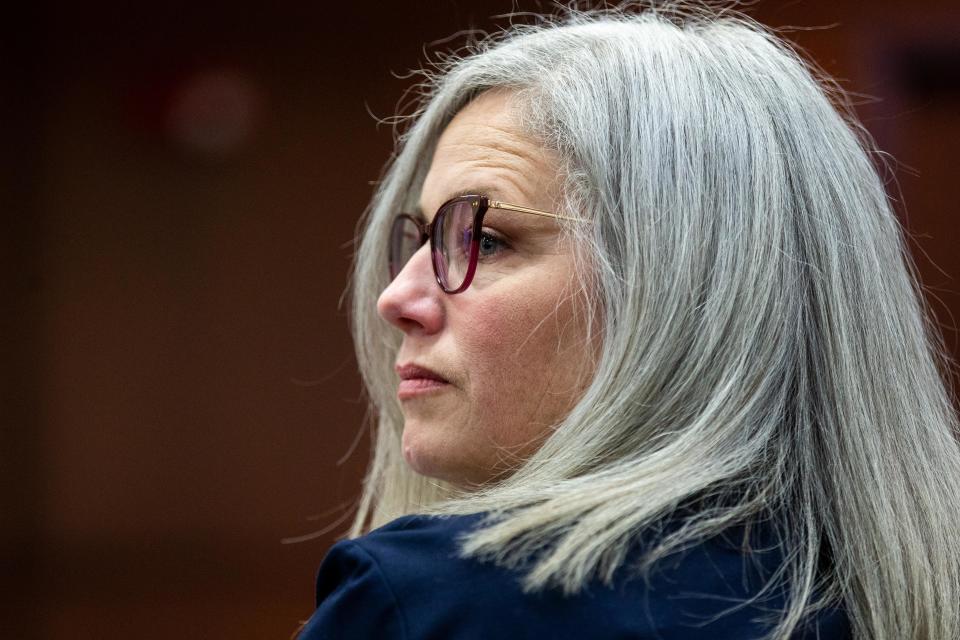
“I can't even make a plan around it,” she told The Sentinel on Wednesday. “There's a line that you can maybe cut up to, where you could squeeze funds from here and there. But there's a point and a line where it's just no longer feasible to exist at all.”
Since January, OI and the newly appointed Hambley have been at odds — mainly over the ultraconservative group's grievances over county and state COVID-19 mitigation measures during the height of the pandemic.
OI founders Joe Moss and Sylvia Rhodea launched the grassroots effort to "thwart tyranny," a reference to the previous board’s refusal to fire former health officer Lisa Stefanovsky over a pre-K-6 mask mandate; the board’s position was largely based on county attorney advice that firing Stefanovsky would likely violate state law, unless she was neglectful or derelict in her duties.
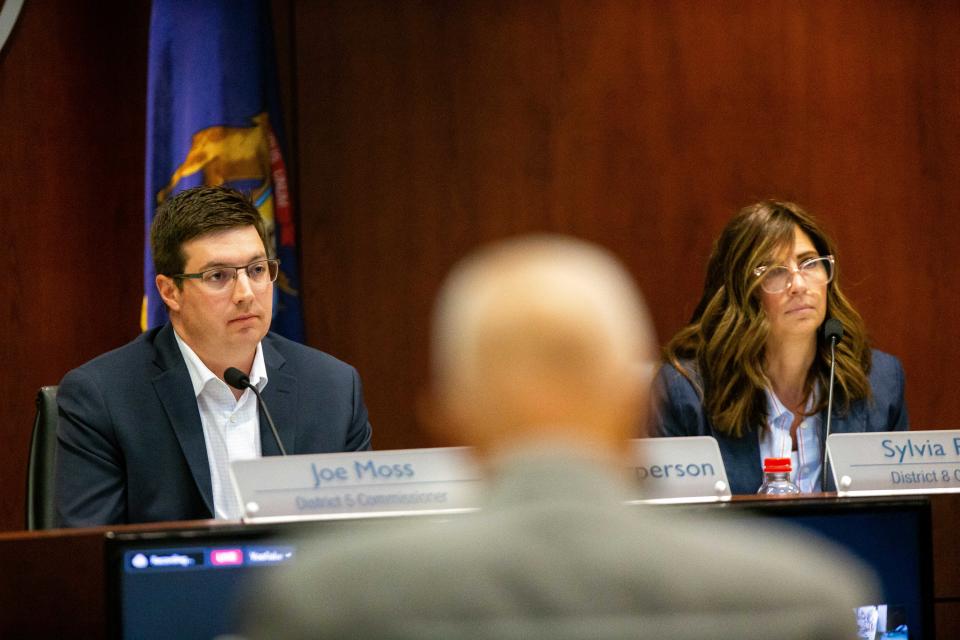
That inspired Moss and Rhodea to challenge nine of the 10 Republicans on the board, recruiting like-minded candidates and fleshing out a political platform that rejected diversity, equity and inclusion; framed sex education in schools as radical; and portrayed the LGBTQ+ community as groomers.
Eight candidates were successful. Shortly after taking the oath of office in January, a series of controversial moves were made, including firing the previous county administrator and former corporation counsel, demoting Hambley and eliminating the county's Diversity, Equity and Inclusion Office.
More: Ottawa County considers slashing health department budget by millions
More: Does OI's newest resolution lay a 'trap' for health department staff?
But the health department remains, it seems, OI's main target, as Moss calls for a return to funding levels that not only pre-dates the COVID-19 pandemic, but would reduce the budget to numbers not seen this century.
"The significant and retaliatory cuts requested on behalf of Commissioner Moss are an attempt to achievepolitical victory over COVID‐19 at the expense of Ottawa County citizens," Hambley wrote in a statement Thursday.
"It is being suggested that the general fund amount of $2.5 million is bringing the budget back in line with average pre‐COVID‐19 funding levels. However, this cut is not returning to 'historic budget levels' — at no point in the last 20 years has the total general fund allocation to public health been $2.5 million."
How we got here
Much of the animosity between the board and health department comes from Moss’ failed attempt at defying the temporary closure of Libertas Christian School, a private school Moss helped found after his high school alma mater, Freedom Christian, closed in Hudsonville due to low enrollment and declining donations.
Moss had at least one child attending Libertas during the county-issued pre-K-6 mask mandate, which he and several other parents construed as an infringement on their parental rights.

He financially supported a lawsuit filed by a parent group in September 2021 that claimed Stefanovsky overstepped her authority and should have sought approval from the board of commissioners before issuing her mask order.
The suit was ultimately dismissed, after an appeals court in December 2022 said Stefanovsky acted legally and appropriately when she issued the mandate, which was rescinded shortly after a vaccine was approved by the FDA for the 5-11 age group.
Two years on, Moss still frequently invokes the experience during board meetings, where he now serves as chair.
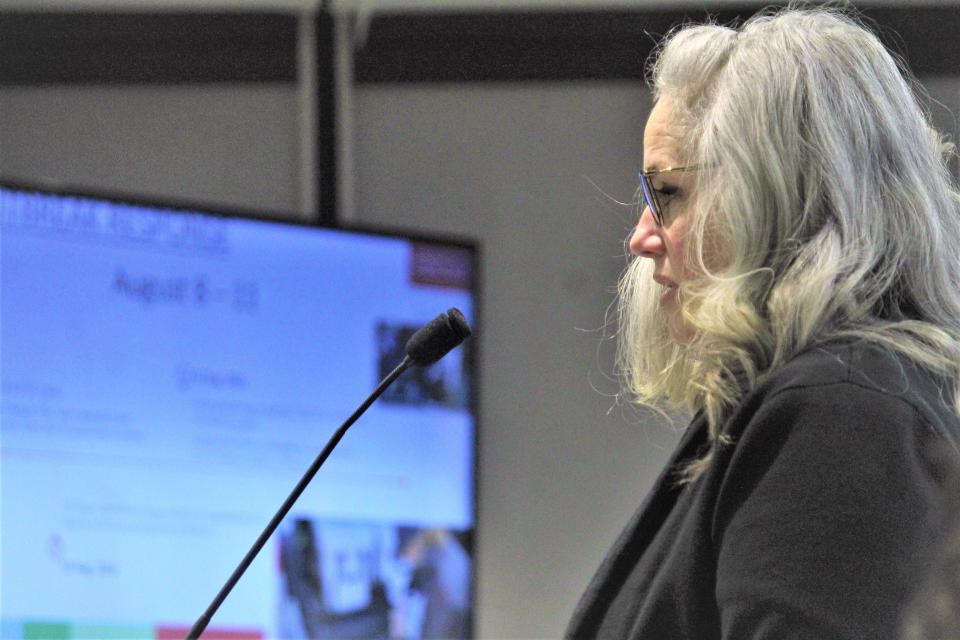
In February, Moss told Hambley: “I just want to be clear that the Ottawa County Board of Commissioners has a very firm stance on mandates, and that there will not be mandates in Ottawa County. … (The) Ottawa County local government health department will not overstep parental rights. I just wanted to make that exceedingly clear.”
“Ultimately — the decision, because the liability lies on the health officer role, the decision lies on the health officer role,” Hambley said.
She went on to file a lawsuit eight days later, claiming the OI majority had repeatedly interfered with her ability to do her job and overreached their authority by attempting to limit her state-authorized health duties.
More: Ottawa Impact broadens control in new communications lockdown mandate
Other actions that underscore OI commissioners’ laser-focus on the health department:
Moss’ erroneous claim the department sponsored Grand Valley State University’s 2023 Sex Ed Week
Refusing, for a time, to approve federal grant-funded mental health positions and state-funded nonprofit projects
Claiming that Pride events “groom children,” and therefore it’s inappropriate for health workers to have a presence at such events
Delaying the renewal of a contract with My Community Dental Centers to provide dental care for children and adults who don't have dental insurance or access to adequate oral healthcare
Having new corporation counsel Kallman Legal Group thrice revise the health department’s state-required plan of organization, an unprecedented intervention, according to health officials
Rejecting a grant for a social media campaign focused on mental health and suicide prevention in men, and another that would've helped make the department’s clinic more accessible and sensory-friendly
How it’s going
Prior to taking office, Moss sent assurances to Hambley about what an Ottawa Impact majority would mean for her department.
"Since you have been appointed as the new health officer, I want to dispel one of the myths that our local media has been reporting (regarding health department funding in 2023)," Moss wrote in a Dec. 19 email. "Several people have brought this concern to me, and I want to make sure you hear from me directly."
Moss has never responded to The Sentinel’s requests for comment.
Despite that promise, Moss has proposed what he frames as “historical, pre-COVID levels” of funding, arguing increases during the pandemic have allowed the health department to “interfere with schools and parental rights,” “increase student and athlete anxiety” and “threaten parents and school administrators,” among other claims.
“A majority of the current board of commissioners has clearly stated they will prioritize limited government, family values, individual freedoms and parental rights,” he wrote in a prepared statement on his political campaign’s website.
“The solution would reduce the general fund allocation to $2.5 million and allow the public health department to retain a budget of approximately $9 million in 2024, providing the department the funds to fulfill statutory requirements and meet the needs of the community as it did historically.”
Hambley says that’s not accurate, and it isn't clear where Moss is getting the $9 million figure.
“Moss’ proposal would slash health department funding from a $6.4 million total general fund contribution to a total of $2.5 million, a reduction of over 60 percent,” she told County Administrator John Gibbs in an email Aug. 22.
The department submitted its budget proposal for the upcoming fiscal year, which begins Oct. 1, weeks ago, with a flat ask of $6.43 million from the general fund, the same amount as the current fiscal year.
What often isn't taken into account, Hambley said, is administrative and information technology costs, which this year totaled $1.78 million, leaving an adjusted operating budget of $4.56 million.
If officials pursue a general fund allocation of $2.5 million, and administrative costs remain fixed at $1.78 million, the health department would have approximately $800,000 from the general fund to provide services.
Hambley struggled Wednesday to frame what that could mean for the future of public health in the county.
“At $2.5 million … with again, $1.7 million going back … so essentially $800,000? I … I don't … I don't know, I don't even know how to propose an operating budget for that,” she said Wednesday.
At the turn of the century, the general fund allocation for the health department was $3.58 million. Over the early aughts, that steadily increased to peak at $5.93 million in 2007, followed by a massive economic downturn after the U.S. housing market imploded.
“We had to go down $1.2 million,” Stefanovsky told The Sentinel on Thursday. “And it almost sunk the ship. We didn't refill a bunch of positions. We did have a few layoffs. We tightened the belts so much that it was difficult.”
General fund allocations to the health department dropped to hover around $3 million for the next 10 years, with the lowest funding year of $2.84 million in 2015.
If the board forges ahead with the $2.5 million figure, it would bring a “total operating budget for 2024 to $500,000 less than the 2009 budget,” Hambley said. It would also be the lowest contribution in this century.
Stefanovsky said the department was just returning to where it needed to be funding-wise when COVID-19 came along, and the proposed funding levels don't account for increases in cost of living, inflationary pressures, or the addition of thousands of constituents to Ottawa County since 2008.
Stefanovsky told The Sentinel she’s saddened by what she sees her former colleagues going through.
“They want to fulfill the needs of their group of people,” she said of the OI commissioners. “They're forgetting, intentionally, that everybody isn't like them. Everyone should have the same freedoms.”
She said it’s understandable that parents were frustrated during COVID, but that most people have moved on.
“They didn't get their freedom taken away,” she said. “Even when it came to the mask mandate, we were in the middle of a pandemic, and we did the absolute least three direct restrictive measures that were the best science at the time to keep our population safe — and I'm sorry that they're upset about it. But my gosh, it's been two years and we're all trying to move on from it.”
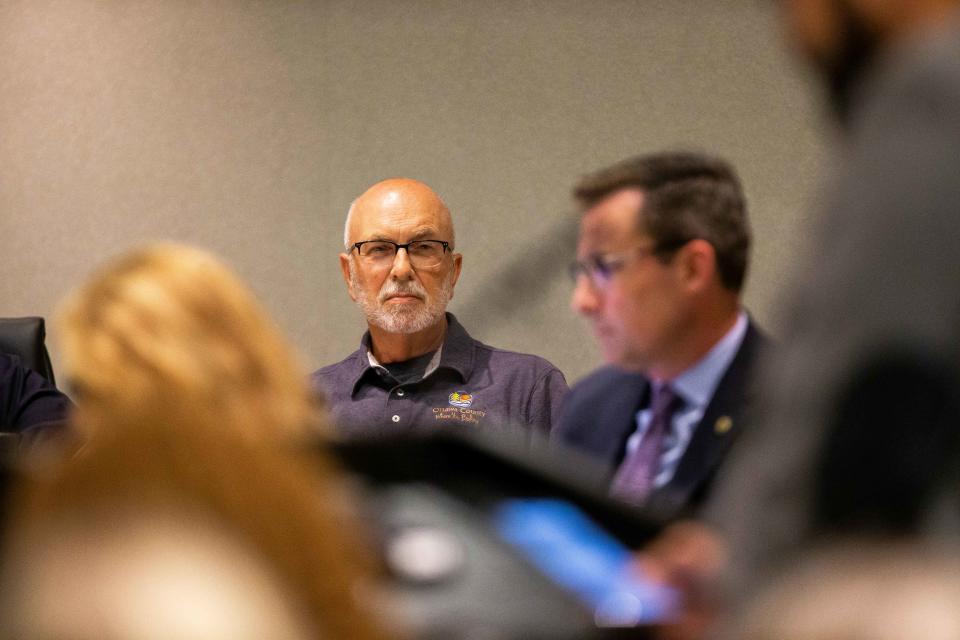
What's said in public vs. what happens in private
The county has been in the process of preparing a budget for fiscal year 2024 for months, and is set to have a public hearing Sept. 12. Hambley, however, was asked Aug. 17 to pare down the budget she'd already submitted by eliminating any COVID-19 grant money allotted.
No other departments were asked to cut their budgets, according to county officials.
She was given one day to complete the task.
The request came after the board decided against cutting department budgets across the board by 5 percent — a suggestion from finance committee chair and OI Commissioner Gretchen Cosby on Aug. 10.
More: Ottawa County considers budget, capital improvement plans
More: Ottawa County commissioners discuss potential budget changes
On Aug. 21, when the finance committee met again, Gibbs said the cuts weren't feasible, given the timeframe.
“It was stated that the process was complex, and it was recommended an external consultant be hired to identify efficiencies without sacrificing services," Hambley wrote on social media earlier this week. "Public health is being asked to cut more than 10 times that in just two days — with no consultant assisting.”
And while Rhodea admitted publicly $2.5 million might be too low a target — she suggested she was comfortable coming up to $3 million — those conversations haven’t been reflected in communications between the administrator’s office and the health department.
“Please proceed with producing a budget with a general fund contribution as close to the below‐directed level as possible, which discontinues all COVID‐related grants,” Gibbs wrote in an Aug. 23 email to Hambley.
This was after Hambley explained in a prior email that COVID-19-related grants — which come on top of the general fund allocation — total over $2.2 million dollars. Those federal funds can be used for mandated services beyond the pandemic, including for the prevention of communicable diseases and outbreak investigation, she said.
“There are nearly 100 communicable diseases beyond COVID-19 that are nationally reportable and require public health action,” she told him. He ignored that advice and told her to proceed.
Gibbs has never responded to The Sentinel’s requests for comment.
Commissioner Doug Zylstra, the board's lone Democrat, pushed back against the cuts at the Aug. 21 finance meeting.
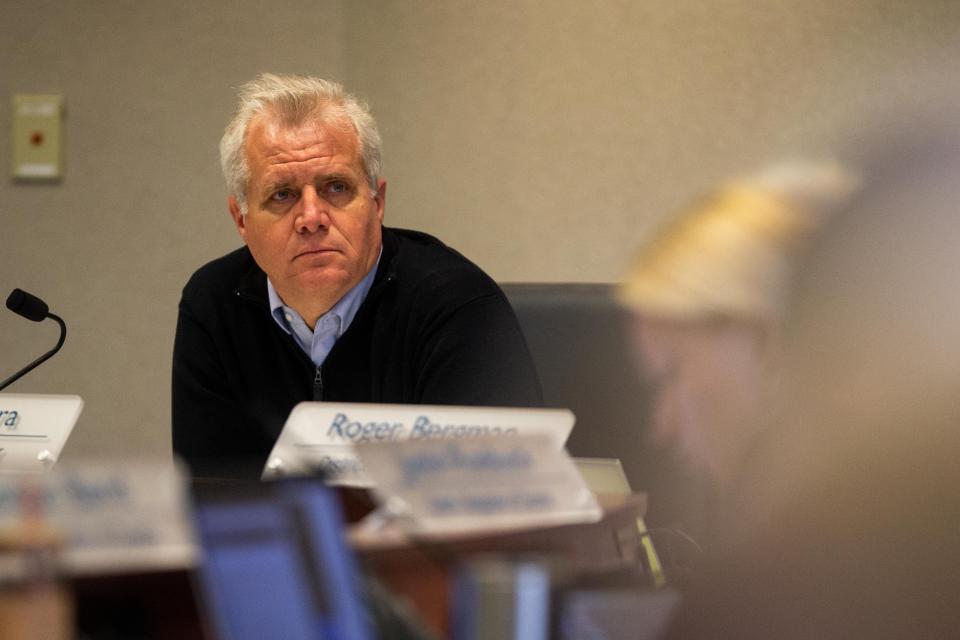
“Frankly, I don’t see how, in any responsible scenario you reduce (the) public health budget to 30 percent below 2001 levels,” he said.
Rhodea said Zylstra was trying to “reframe this conversation.”
At this past Monday’s Budget Work Session, Board Chairman Joe Moss proposed the idea of drastic cuts to the Ottawa County Public Health Department. Over the last days, the Health Department has worked diligently to explain to the Ottawa community the meaning and the… pic.twitter.com/TQxFcun8vA
— Commissioner Zylstra (@OCCommZylstra) August 25, 2023
Zylstra released a statement Thursday evening, saying, "defunding critical health services at this time, especially when there is no fiscal need, is both irresponsible and unnecessary. ... It is my hope that over the next weeks we can have further conversations around this proposal with residents and stakeholders alike with the goal of maintaining and improving our public health efforts, and part of that is augmenting, not cutting, our general fund investments in those efforts."
Commissioner Jacob Bonnema, who split from Ottawa Impact in March, told The Sentinel this week he opposed the severe cuts.
“I oppose any cuts that affect state-mandated services to our citizens,” he said.
What would happen to services?
The unprecedented cuts translate to real impact for Ottawa County residents, according to health department officials, including discontinued services and staff loss. As inflation balloons and the county's population continues to grow, it's unclear why the board is looking to cut funding — Moss gave only vague answers, citing the end of the pandemic and the will of the voters to "go in a new direction."
On Thursday, health officials said Moss’ $2.5 million target would mean eliminating 12 programs immediately and laying off any staff attached to them.
They would include Children’s Special Health Care Services, the Dental Sealant Program and Miles of Smiles Mobile Dental Office, the Maternal and Infant Health Program, Family Planning and Women’s Health Services, Ottawa Food, the Suicide Prevention Coalition, Pathways to Better Health and more.
Officials outlined two scenarios, one in which the department would run only essential services and mandated public health administration, then shut down altogether just four weeks after the start of the fiscal year. Under the second scenario, the department would apply general funds to five essential services that can't charge fees: hearing and vision screenings, STD testing and treatment, a communicable disease program, and an immunization and waiver program.
Programs that charge fees would remain, but fees would increase dramatically to cover the cost of operation — including food inspections, real estate transfer evaluations, and water well permits and monitoring.
"These cuts do not save taxpayers money but serve to reduce services that the county is required to provide toprotect the health and safety of the community. It strips citizens of the services they are guaranteed under thelaw and the rights they are granted under the Michigan Constitution," Hambley wrote Thursday. "These actions are not fiscally conservative but fiscally, and legally, irresponsible."
Health industry officials echoed that sentiment.
“Clearly, a budget reduction of this magnitude will have far-reaching impacts on the health department’s ability to provide services to Ottawa County residents,” said Norm Hess, executive director of the Michigan Association for Local Public Health.

“Public health services help us live in safer conditions. This includes protecting the water we drink, the food we eat, and creating conditions that are healthy for living,” Hess said. “I doubt the residents of any county in Michigan would find the bare minimum level of public health protection and service to be acceptable.”
Hess said there could also be “unforeseen consequences." If the county is too underfunded, he said, it won’t have the money necessary to meet grant match requirements.
“The more reliant the department becomes on state and federal funding sources, which generally come with heavy spending restrictions, the less control the county has to make decisions to direct funding to meet local needs,” Hess said.
Reducing or eliminating services in one program can have a direct impact on other programs, too, Hess said. For example, nursing staff may provide clinical services across several areas. If services are cut in one area, it may impact the department’s ability to retain staff who serve other programs.
There's also the question of “maintenance of effort,” or federal regulations governing grant programs, which stipulate the state or locality receiving a grant must maintain or contribute a certain level of financial effort in a specified area. It cannot include administrative costs.
Subscribe: Get all your breaking news and unlimited access to our local coverage
In the 1992-93 fiscal year, Michigan set that funding level for health departments at $2,034,000. That means the county would have to raise the general fund allocation to at least $3,698,989 or face possible consequences. There are also legal consequences to consider, as Hambley's lawsuit against the board is ongoing.
On his website this week, Moss boasted the $2.5 general fund allocation would result in taxpayer savings of $4.18 million.
Hess said that’s not likely to equate to putting money back in taxpayers’ pockets.
“I have never witnessed a situation when sending unspent money back to the state or federal government has directly benefited individual taxpayers,” he said. “They don’t see that money in their pockets. Rather, it sends the message that funding is not needed, local services suffer, and taxpayer dollars are redirected to other communities.”
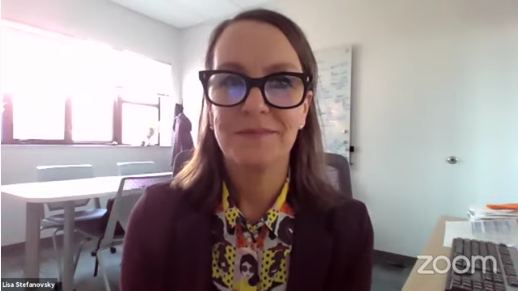
Stefanovsky, who retired in March, said it’s difficult to watch, but she remains hopeful.
“It's really heartbreaking, but these are strong individuals,” she said. “They are smart. They are absolutely committed to the community. And, you know, one thing about public health is all of us are public servants that are here to serve everybody in our community that needs it — even Joe Moss.”
— Sarah Leach is executive editor of The Holland Sentinel. Contact her at sarah.leach@hollandsentinel.com. Follow her on Twitter @SentinelLeach.
This article originally appeared on The Holland Sentinel: Hambley: Health department could shut down in weeks under proposed budget

